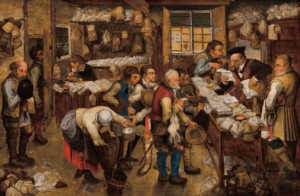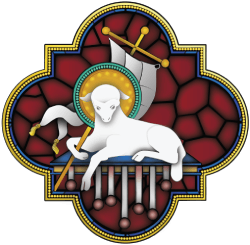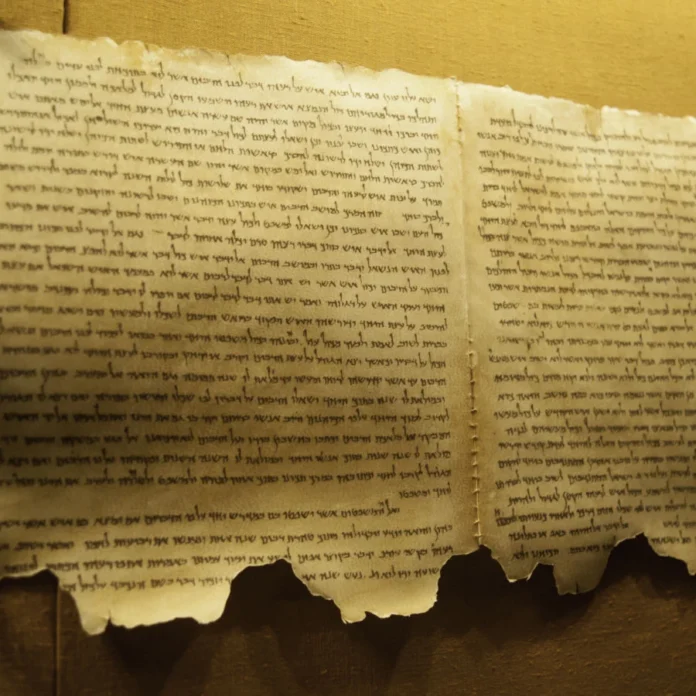Daily Devotional • October 1

A Reading from Luke 5:27-39
27 After this he went out and saw a tax collector named Levi sitting at the tax-collection station, and he said to him, “Follow me.” 28 And he got up, left everything, and followed him.
29 Then Levi gave a great banquet for him in his house, and there was a large crowd of tax collectors and others reclining at the table with them. 30 The Pharisees and their scribes were complaining to his disciples, saying, “Why do you eat and drink with tax collectors and sinners?” 31 Jesus answered them, “Those who are well have no need of a physician but those who are sick; 32 I have not come to call the righteous but sinners to repentance.”
33 Then they said to him, “John’s disciples, like the disciples of the Pharisees, frequently fast and pray, but your disciples eat and drink.” 34 Jesus said to them, “You cannot make wedding attendants fast while the bridegroom is with them, can you? 35 The days will come when the bridegroom will be taken away from them, and then they will fast in those days.” 36 He also told them a parable: “No one tears a piece from a new garment and sews it on an old garment; otherwise, not only will one tear the new garment, but the piece from the new will not match the old garment. 37 Similarly, no one puts new wine into old wineskins; otherwise, the new wine will burst the skins and will spill out, and the skins will be ruined. 38 But new wine must be put into fresh wineskins. 39 And no one after drinking old wine desires new wine but says, ‘The old is good.’”
Meditation
Jesus doesn’t erase distinctions. He reveals the lines of grace.
In this lesson are some familiar and customary boundaries and practices that Jesus, almost quietly, redefines. Or, maybe better put, he takes them to greater depths and shows the marvelous open secret that they hide.
First there is the boundary between “Pharisees and teachers of the law” and “tax collectors and sinners.” When the former ask Jesus why he eats and drinks with the latter, he both affirms the boundary and redefines it. He contrasts “the healthy” with “the sick,” and “the righteous” with “sinners.” These are boundaries and definitions that the Pharisees and teachers of the law could understand and accept, but what makes Jesus’ distinction different is that the Pharisees consider sinners to be beyond hope — “This mob knows nothing of the law — there is a curse on them” (John 7:49) — while Jesus sees sinners as those who need help: “The Son of Man came to seek and to save the lost” (Luke 19:10).
Similarly, the Pharisees ask Jesus why his disciples do not fast — presumably according to the customs that the Pharisees follow. Jesus’ answer appeals not to a custom but to a person — namely, himself, as the bridegroom. That is, he puts the emphasis not on tradition or custom, but on the deeper reality of a relationship with the one about whom the traditions and customs were first established.
There is no sense of tension or opposition in these lessons (though that is found in other encounters), but mere query. Jesus summarizes his answers in the teaching about patching a garment or storing new wine. Many chapters later, Jesus will mourn over Jerusalem (19:41-44), which brings into sharp focus what we see in today’s relatively peaceful encounters: in dedication to custom above all else, those who claim to be faithful show themselves to be willfully blind to the presence of the Messiah.
David Baumann is a published writer of nonfiction, science fiction, and short stories. In his ministry as an Episcopal priest, he served congregations in Illinois and California.
♱
Daily Devotional Cycle of Prayer
Today we pray for:
The Diocese of Jebba – The Church of Nigeria (Anglican Communion)
The Episcopal Diocese of West Texas




